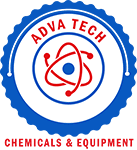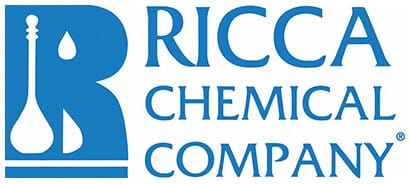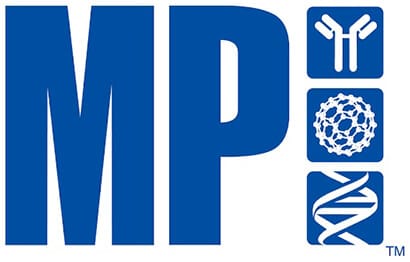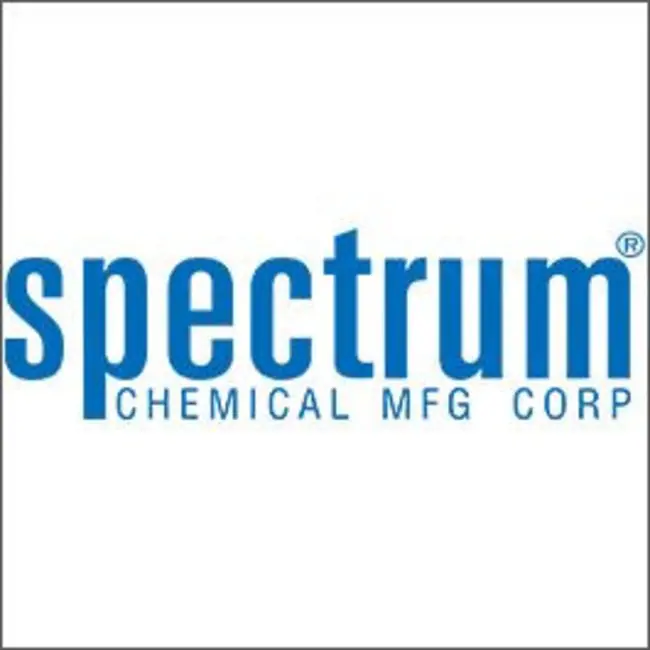GenScript Biotech
Showing 1051–1100 of 2554 results
-
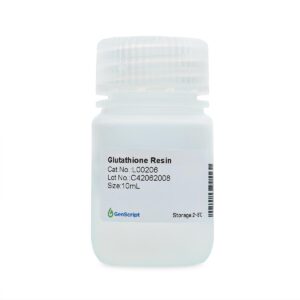
Glutathione Resin
$96.60 Add to cart View Product DetailsGlutathione Resin (Cat. No. L00206) is an
affinity chromatography medium designed for easy, one-step purification of
recombinant glutathione S-transferase (GST) fusion proteins and other
glutathione binding proteins expressed in E. coli, insect cells and mammalian
cells. The recombinant GST fusion proteins can be purified directly from
pre-treated cell lysate using Glutathione Resin. It is the excellent choice for
high performance purifications.
GST Fusion Protein Purification Kit (Cat. No. L00207) is the derivate products of
Glutathione Resin which includes five disposable columns and five 0.154 g
samples of glutathione to facilitate protein purification. -
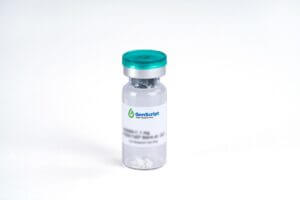
Glutathione S-Transferase
$64.69 Add to cart View Product DetailsGlutathione S-Transferase (GST), an antioxidant enzyme, is involved in the primary cellular defense mechanism against reactive oxygen species. GST is soluble in water and has a mass of 26.98 kDa. It occurs as a dimer in all aerobic organisms.
-
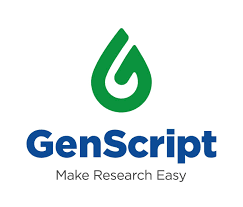
GM-CSF, Human
$1,923.38 Add to cart View Product DetailsGranulocyte Macrophage-Colony Stimulating Factor (GM-CSF) was initially characterized as a growth factor that can support the in vitro colony formation of granulocyte-macrophage progenitors. Granulocyte Macrophage-Colony Stimulating Factor (GM-CSF) is produced by a number of different cell types, including activated T cells, B cells, macrophages, mast cells, endothelial cells, and fibroblasts, in response to cytokine of immune and inflammatory stimuli. Besides granulocyte-macrophage progenitors, Granulocyte Macrophage-Colony Stimulating Factor (GM-CSF) is a growth factor for erythroid, megakaryocyte, and eosinophil progenitors. On mature hematopoietic, monocytes/macrophages and eosinophils. Human Granulocyte Macrophage-Colony Stimulating Factor (GM-CSF) can induce human endothelial cells to migrate and proliferate. Additionally, Granulocyte Macrophage-Colony Stimulating Factor (GM-CSF) can stimulate the proliferation of a number of tumor cell lines, including osteogenic sarcoma, carcinoma, and adenocarcinoma cell lines.
-

GM-CSF, Human
$2,018.25 Add to cart View Product DetailsGranulocyte Macrophage-Colony Stimulating Factor (GM-CSF) was initially characterized as a growth factor that can support the in vitro colony formation of granulocyte-macrophage progenitors. Granulocyte Macrophage-Colony Stimulating Factor (GM-CSF) is produced by a number of different cell types, including activated T cells, B cells, macrophages, mast cells, endothelial cells, and fibroblasts, in response to cytokine of immune and inflammatory stimuli. Besides granulocyte-macrophage progenitors, Granulocyte Macrophage-Colony Stimulating Factor (GM-CSF) is a growth factor for erythroid, megakaryocyte, and eosinophil progenitors. On mature hematopoietic, monocytes/macrophages and eosinophils. Human Granulocyte Macrophage-Colony Stimulating Factor (GM-CSF) can induce human endothelial cells to migrate and proliferate. Additionally, Granulocyte Macrophage-Colony Stimulating Factor (GM-CSF) can stimulate the proliferation of a number of tumor cell lines, including osteogenic sarcoma, carcinoma, and adenocarcinoma cell lines.
-
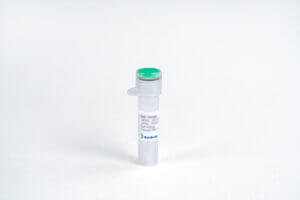
GM-CSF, Human
$86.25 Add to cart View Product DetailsGranulocyte Macrophage-Colony Stimulating Factor (GM-CSF) was initially characterized as a growth factor that can support the in vitro colony formation of granulocyte-macrophage progenitors. Granulocyte Macrophage-Colony Stimulating Factor (GM-CSF) is produced by a number of different cell types, including activated T cells, B cells, macrophages, mast cells, endothelial cells, and fibroblasts, in response to cytokine of immune and inflammatory stimuli. Besides granulocyte-macrophage progenitors, Granulocyte Macrophage-Colony Stimulating Factor (GM-CSF) is a growth factor for erythroid, megakaryocyte, and eosinophil progenitors. On mature hematopoietic, monocytes/macrophages and eosinophils. Human Granulocyte Macrophage-Colony Stimulating Factor (GM-CSF) can induce human endothelial cells to migrate and proliferate. Additionally, Granulocyte Macrophage-Colony Stimulating Factor (GM-CSF) can stimulate the proliferation of a number of tumor cell lines, including osteogenic sarcoma, carcinoma, and adenocarcinoma cell lines.
-

GM-CSF, Human
$271.69 Add to cart View Product DetailsGranulocyte Macrophage-Colony Stimulating Factor (GM-CSF) was initially characterized as a growth factor that can support the in vitro colony formation of granulocyte-macrophage progenitors. Granulocyte Macrophage-Colony Stimulating Factor (GM-CSF) is produced by a number of different cell types, including activated T cells, B cells, macrophages, mast cells, endothelial cells, and fibroblasts, in response to cytokine of immune and inflammatory stimuli. Besides granulocyte-macrophage progenitors, Granulocyte Macrophage-Colony Stimulating Factor (GM-CSF) is a growth factor for erythroid, megakaryocyte, and eosinophil progenitors. On mature hematopoietic, monocytes/macrophages and eosinophils. Human Granulocyte Macrophage-Colony Stimulating Factor (GM-CSF) can induce human endothelial cells to migrate and proliferate. Additionally, Granulocyte Macrophage-Colony Stimulating Factor (GM-CSF) can stimulate the proliferation of a number of tumor cell lines, including osteogenic sarcoma, carcinoma, and adenocarcinoma cell lines.
-

GM-CSF, Human (P. pastoris-expressed)
$2,018.25 Add to cart View Product DetailsGranulocyte Macrophage-Colony Stimulating Factor (GM-CSF) was initially characterized as a growth factor that can support the in vitro colony formation of granulocyte-macrophage progenitors. Granulocyte Macrophage-Colony Stimulating Factor (GM-CSF) is produced by a number of different cell types, including activated T cells, B cells, macrophages, mast cells, endothelial cells, and fibroblasts, in response to cytokine of immune and inflammatory stimuli. Besides granulocyte-macrophage progenitors, Granulocyte Macrophage-Colony Stimulating Factor (GM-CSF) is a growth factor for erythroid, megakaryocyte, and eosinophil progenitors. On mature hematopoietic, monocytes/macrophages and eosinophils. Human Granulocyte Macrophage-Colony Stimulating Factor (GM-CSF) can induce human endothelial cells to migrate and proliferate. Additionally, Granulocyte Macrophage-Colony Stimulating Factor (GM-CSF) can stimulate the proliferation of a number of tumor cell lines, including osteogenic sarcoma, carcinoma, and adenocarcinoma cell lines.
-
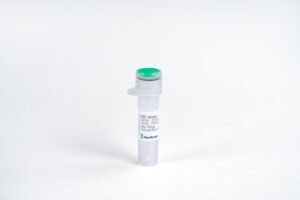
GM-CSF, Human(CHO-expressed)
$2,018.25 Add to cart View Product DetailsGranulocyte Macrophage-Colony Stimulating Factor (GM-CSF) was initially characterized as a growth factor that can support the in vitro colony formation of granulocyte-macrophage progenitors. Granulocyte Macrophage-Colony Stimulating Factor (GM-CSF) is produced by a number of different cell types, including activated T cells, B cells, macrophages, mast cells, endothelial cells, and fibroblasts, in response to cytokine of immune and inflammatory stimuli. Besides granulocyte-macrophage progenitors, Granulocyte Macrophage-Colony Stimulating Factor (GM-CSF) is a growth factor for erythroid, megakaryocyte, and eosinophil progenitors. On mature hematopoietic, monocytes/macrophages and eosinophils. Human Granulocyte Macrophage-Colony Stimulating Factor (GM-CSF) can induce human endothelial cells to migrate and proliferate. Additionally, Granulocyte Macrophage-Colony Stimulating Factor (GM-CSF) can stimulate the proliferation of a number of tumor cell lines, including osteogenic sarcoma, carcinoma, and adenocarcinoma cell lines.
-

GM-CSF, Human(CHO-expressed)
$86.25 Add to cart View Product DetailsGranulocyte Macrophage-Colony Stimulating Factor (GM-CSF) was initially characterized as a growth factor that can support the in vitro colony formation of granulocyte-macrophage progenitors. Granulocyte Macrophage-Colony Stimulating Factor (GM-CSF) is produced by a number of different cell types, including activated T cells, B cells, macrophages, mast cells, endothelial cells, and fibroblasts, in response to cytokine of immune and inflammatory stimuli. Besides granulocyte-macrophage progenitors, Granulocyte Macrophage-Colony Stimulating Factor (GM-CSF) is a growth factor for erythroid, megakaryocyte, and eosinophil progenitors. On mature hematopoietic, monocytes/macrophages and eosinophils. Human Granulocyte Macrophage-Colony Stimulating Factor (GM-CSF) can induce human endothelial cells to migrate and proliferate. Additionally, Granulocyte Macrophage-Colony Stimulating Factor (GM-CSF) can stimulate the proliferation of a number of tumor cell lines, including osteogenic sarcoma, carcinoma, and adenocarcinoma cell lines.
-

GM-CSF, Human(CHO-expressed)
$271.69 Add to cart View Product DetailsGranulocyte Macrophage-Colony Stimulating Factor (GM-CSF) was initially characterized as a growth factor that can support the in vitro colony formation of granulocyte-macrophage progenitors. Granulocyte Macrophage-Colony Stimulating Factor (GM-CSF) is produced by a number of different cell types, including activated T cells, B cells, macrophages, mast cells, endothelial cells, and fibroblasts, in response to cytokine of immune and inflammatory stimuli. Besides granulocyte-macrophage progenitors, Granulocyte Macrophage-Colony Stimulating Factor (GM-CSF) is a growth factor for erythroid, megakaryocyte, and eosinophil progenitors. On mature hematopoietic, monocytes/macrophages and eosinophils. Human Granulocyte Macrophage-Colony Stimulating Factor (GM-CSF) can induce human endothelial cells to migrate and proliferate. Additionally, Granulocyte Macrophage-Colony Stimulating Factor (GM-CSF) can stimulate the proliferation of a number of tumor cell lines, including osteogenic sarcoma, carcinoma, and adenocarcinoma cell lines.
-

GM-CSF, Mouse
$2,018.25 Add to cart View Product DetailsGranulocyte Macrophage-Colony Stimulating Factor (GM-CSF) was initially characterized as a growth factor that can support the in vitro colony formation of granulocyte-macrophage progenitors. Granulocyte Macrophage-Colony Stimulating Factor (GM-CSF) is produced by a number of different cell types, including activated T cells, B cells, macrophages, mast cells, endothelial cells, and fibroblasts, in response to cytokine of immune and inflammatory stimuli. Besides granulocyte-macrophage progenitors, Granulocyte Macrophage-Colony Stimulating Factor (GM-CSF) is a growth factor for erythroid, megakaryocyte, and eosinophil progenitors. On mature hematopoietic, monocytes/macrophages and eosinophils. Additionally, Granulocyte Macrophage-Colony Stimulating Factor (GM-CSF) can stimulate the proliferation of a number of tumor cell lines, including osteogenic sarcoma, carcinoma, and adenocarcinoma cell lines.
-

GM-CSF, Mouse
$86.25 Add to cart View Product DetailsGranulocyte Macrophage-Colony Stimulating Factor (GM-CSF) was initially characterized as a growth factor that can support the in vitro colony formation of granulocyte-macrophage progenitors. Granulocyte Macrophage-Colony Stimulating Factor (GM-CSF) is produced by a number of different cell types, including activated T cells, B cells, macrophages, mast cells, endothelial cells, and fibroblasts, in response to cytokine of immune and inflammatory stimuli. Besides granulocyte-macrophage progenitors, Granulocyte Macrophage-Colony Stimulating Factor (GM-CSF) is a growth factor for erythroid, megakaryocyte, and eosinophil progenitors. On mature hematopoietic, monocytes/macrophages and eosinophils. Additionally, Granulocyte Macrophage-Colony Stimulating Factor (GM-CSF) can stimulate the proliferation of a number of tumor cell lines, including osteogenic sarcoma, carcinoma, and adenocarcinoma cell lines.
-

GM-CSF, Mouse
$271.69 Add to cart View Product DetailsGranulocyte Macrophage-Colony Stimulating Factor (GM-CSF) was initially characterized as a growth factor that can support the in vitro colony formation of granulocyte-macrophage progenitors. Granulocyte Macrophage-Colony Stimulating Factor (GM-CSF) is produced by a number of different cell types, including activated T cells, B cells, macrophages, mast cells, endothelial cells, and fibroblasts, in response to cytokine of immune and inflammatory stimuli. Besides granulocyte-macrophage progenitors, Granulocyte Macrophage-Colony Stimulating Factor (GM-CSF) is a growth factor for erythroid, megakaryocyte, and eosinophil progenitors. On mature hematopoietic, monocytes/macrophages and eosinophils. Additionally, Granulocyte Macrophage-Colony Stimulating Factor (GM-CSF) can stimulate the proliferation of a number of tumor cell lines, including osteogenic sarcoma, carcinoma, and adenocarcinoma cell lines.
-

GM-CSF, Mouse
$1,470.56 Add to cart View Product DetailsGranulocyte Macrophage-Colony Stimulating Factor (GM-CSF) was initially characterized as a growth factor that can support the in vitro colony formation of granulocyte-macrophage progenitors. Granulocyte Macrophage-Colony Stimulating Factor (GM-CSF) is produced by a number of different cell types, including activated T cells, B cells, macrophages, mast cells, endothelial cells, and fibroblasts, in response to cytokine of immune and inflammatory stimuli. Besides granulocyte-macrophage progenitors, Granulocyte Macrophage-Colony Stimulating Factor (GM-CSF) is a growth factor for erythroid, megakaryocyte, and eosinophil progenitors. On mature hematopoietic, monocytes/macrophages and eosinophils. Additionally, Granulocyte Macrophage-Colony Stimulating Factor (GM-CSF) can stimulate the proliferation of a number of tumor cell lines, including osteogenic sarcoma, carcinoma, and adenocarcinoma cell lines.
-

GM-CSF, Mouse
$68.14 Add to cart View Product DetailsGranulocyte Macrophage-Colony Stimulating Factor (GM-CSF) was initially characterized as a growth factor that can support the in vitro colony formation of granulocyte-macrophage progenitors. Granulocyte Macrophage-Colony Stimulating Factor (GM-CSF) is produced by a number of different cell types, including activated T cells, B cells, macrophages, mast cells, endothelial cells, and fibroblasts, in response to cytokine of immune and inflammatory stimuli. Besides granulocyte-macrophage progenitors, Granulocyte Macrophage-Colony Stimulating Factor (GM-CSF) is a growth factor for erythroid, megakaryocyte, and eosinophil progenitors. On mature hematopoietic, monocytes/macrophages and eosinophils. Additionally, Granulocyte Macrophage-Colony Stimulating Factor (GM-CSF) can stimulate the proliferation of a number of tumor cell lines, including osteogenic sarcoma, carcinoma, and adenocarcinoma cell lines.
-

GM-CSF, Mouse
$194.06 Add to cart View Product DetailsGranulocyte Macrophage-Colony Stimulating Factor (GM-CSF) was initially characterized as a growth factor that can support the in vitro colony formation of granulocyte-macrophage progenitors. Granulocyte Macrophage-Colony Stimulating Factor (GM-CSF) is produced by a number of different cell types, including activated T cells, B cells, macrophages, mast cells, endothelial cells, and fibroblasts, in response to cytokine of immune and inflammatory stimuli. Besides granulocyte-macrophage progenitors, Granulocyte Macrophage-Colony Stimulating Factor (GM-CSF) is a growth factor for erythroid, megakaryocyte, and eosinophil progenitors. On mature hematopoietic, monocytes/macrophages and eosinophils. Additionally, Granulocyte Macrophage-Colony Stimulating Factor (GM-CSF) can stimulate the proliferation of a number of tumor cell lines, including osteogenic sarcoma, carcinoma, and adenocarcinoma cell lines.
-

GM-CSF, Rat
$1,470.56 Add to cart View Product DetailsGranulocyte Macrophage-Colony Stimulating Factor (GM-CSF) was initially characterized as a growth factor that can support the in vitro colony formation of granulocyte-macrophage progenitors. Granulocyte Macrophage-Colony Stimulating Factor (GM-CSF) is produced by a number of different cell types, including activated T cells, B cells, macrophages, mast cells, endothelial cells, and fibroblasts, in response to cytokine of immune and inflammatory stimuli. Besides granulocyte-macrophage progenitors, Granulocyte Macrophage-Colony Stimulating Factor (GM-CSF) is a growth factor for erythroid, megakaryocyte, and eosinophil progenitors. On mature hematopoietic, monocytes/macrophages and eosinophils. Additionally, Granulocyte Macrophage-Colony Stimulating Factor (GM-CSF) can stimulate the proliferation of a number of tumor cell lines, including osteogenic sarcoma, carcinoma, and adenocarcinoma cell lines.
-

GM-CSF, Rat
$68.14 Add to cart View Product DetailsGranulocyte Macrophage-Colony Stimulating Factor (GM-CSF) was initially characterized as a growth factor that can support the in vitro colony formation of granulocyte-macrophage progenitors. Granulocyte Macrophage-Colony Stimulating Factor (GM-CSF) is produced by a number of different cell types, including activated T cells, B cells, macrophages, mast cells, endothelial cells, and fibroblasts, in response to cytokine of immune and inflammatory stimuli. Besides granulocyte-macrophage progenitors, Granulocyte Macrophage-Colony Stimulating Factor (GM-CSF) is a growth factor for erythroid, megakaryocyte, and eosinophil progenitors. On mature hematopoietic, monocytes/macrophages and eosinophils. Additionally, Granulocyte Macrophage-Colony Stimulating Factor (GM-CSF) can stimulate the proliferation of a number of tumor cell lines, including osteogenic sarcoma, carcinoma, and adenocarcinoma cell lines.
-

GM-CSF, Rat
$155.25 Add to cart View Product DetailsGranulocyte Macrophage-Colony Stimulating Factor (GM-CSF) was initially characterized as a growth factor that can support the in vitro colony formation of granulocyte-macrophage progenitors. Granulocyte Macrophage-Colony Stimulating Factor (GM-CSF) is produced by a number of different cell types, including activated T cells, B cells, macrophages, mast cells, endothelial cells, and fibroblasts, in response to cytokine of immune and inflammatory stimuli. Besides granulocyte-macrophage progenitors, Granulocyte Macrophage-Colony Stimulating Factor (GM-CSF) is a growth factor for erythroid, megakaryocyte, and eosinophil progenitors. On mature hematopoietic, monocytes/macrophages and eosinophils. Additionally, Granulocyte Macrophage-Colony Stimulating Factor (GM-CSF) can stimulate the proliferation of a number of tumor cell lines, including osteogenic sarcoma, carcinoma, and adenocarcinoma cell lines.
-

GM-CSF, RhesusMacaque
$2,785.88 Add to cart View Product DetailsGranulocyte Macrophage-Colony Stimulating Factor (GM-CSF) was initially characterized as a growth factor that can support the in vitro colony formation of granulocyte-macrophage progenitors. Granulocyte Macrophage-Colony Stimulating Factor (GM-CSF) is produced by a number of different cell types, including activated T cells, B cells, macrophages, mast cells, endothelial cells, and fibroblasts, in response to cytokine of immune and inflammatory stimuli. Besides granulocyte-macrophage progenitors, Granulocyte Macrophage-Colony Stimulating Factor (GM-CSF) is a growth factor for erythroid, megakaryocyte, and eosinophil progenitors. On mature hematopoietic, monocytes/macrophages and eosinophils. Additionally, Granulocyte Macrophage-Colony Stimulating Factor (GM-CSF) can stimulate the proliferation of a number of tumor cell lines, including osteogenic sarcoma, carcinoma, and adenocarcinoma cell lines.
-

GM-CSF, RhesusMacaque
$155.25 Add to cart View Product DetailsGranulocyte Macrophage-Colony Stimulating Factor (GM-CSF) was initially characterized as a growth factor that can support the in vitro colony formation of granulocyte-macrophage progenitors. Granulocyte Macrophage-Colony Stimulating Factor (GM-CSF) is produced by a number of different cell types, including activated T cells, B cells, macrophages, mast cells, endothelial cells, and fibroblasts, in response to cytokine of immune and inflammatory stimuli. Besides granulocyte-macrophage progenitors, Granulocyte Macrophage-Colony Stimulating Factor (GM-CSF) is a growth factor for erythroid, megakaryocyte, and eosinophil progenitors. On mature hematopoietic, monocytes/macrophages and eosinophils. Additionally, Granulocyte Macrophage-Colony Stimulating Factor (GM-CSF) can stimulate the proliferation of a number of tumor cell lines, including osteogenic sarcoma, carcinoma, and adenocarcinoma cell lines.
-

GMFB, Human
$2,238.19 Add to cart View Product DetailsGlia maturation factor beta (GMFB) contains an ADF-H domain,which is a member of the actin-binding proteins ADF family, GMF subfamily. It is a nerve growth factor implicated in nervous system development, angiogenesis, and immune function. GMFB causes differentiation of brain cells, stimulation of neural regeneration, and inhibition of proliferation of tumor cells. It is phosphorylated after phorbol ester stimulation and is crucial for the nervous system. GMFB overexpression in astrocytes results in the increase of BDNF production. GMFB expression is increased by exercise, thus BDNF is important for exercise-induction of BDNF.
-

GMFB, Human
$452.81 Add to cart View Product DetailsGlia maturation factor beta (GMFB) contains an ADF-H domain,which is a member of the actin-binding proteins ADF family, GMF subfamily. It is a nerve growth factor implicated in nervous system development, angiogenesis, and immune function. GMFB causes differentiation of brain cells, stimulation of neural regeneration, and inhibition of proliferation of tumor cells. It is phosphorylated after phorbol ester stimulation and is crucial for the nervous system. GMFB overexpression in astrocytes results in the increase of BDNF production. GMFB expression is increased by exercise, thus BDNF is important for exercise-induction of BDNF.
-

GMP Anti-Human CD28 Antibody (F105), mAb, Mouse
$1,035.00 Add to cart View Product DetailsThis product is specific for Human CD28
-

GMP Anti-Human CD28 Antibody (F105), mAb, Mouse
$129.38 Add to cart View Product DetailsThis product is specific for Human CD28
-

GMP Anti-Human CD3 Antibody (OKT3), mAb, Mouse
$1,035.00 Add to cart View Product DetailsThis product is specific for Human CD3
-

GMP Anti-Human CD3 Antibody (OKT3), mAb, Mouse
$129.38 Add to cart View Product DetailsThis product is specific for Human CD3
-

Green Taq DNA Polymerase
$56.93 Add to cart View Product DetailsGreen Taq DNA Polymerase is designed to increase the stability of the Taq enzyme for more convenient transport and applications. The polymerase (1000 U) is designed for 400 rxns if 2.5 U are used per 50 ul PCR reaction. It can be stable for six months if stored at 4°C or for up to one month without significant loss of activity at ambient temperature. Our technology can increase the stability of Green Taq DNA at higher temperature (72°C). The higher yield PCR product can be harvested in long PCR amplification.
Formulation
PCR Reaction Buffer (with Mg 2+ ): 100 mM Tris-HCl, 15 mM MgCl 2 , 500 mM KCl and 1% Triton X-100, pH 8.3 (4°C).
Enzyme Storage Buffer: 20 mM Tris-HCl, 1 mM DTT,0.1 mM EDTA, 0.1 M KCl, 0.5% Nonidet P40 (v/v), 0.5% Tween 20 (v/v), 50% glycerol(v/v), pH 8.0 (4°C)Applications
The applications of Green Taq DNA Polymerase include the following:- PCR(For simple templates, this enzyme can be optimized for amplification of PCR products up to 10 kb; However, for complex templates, this enzyme can be used for amplification of PCR products up to 3 kb.)
- 3’A-tailing of blunt ends (T/A-cloning)
- Primer extension
- DNA labeling reactions
-

GRO alpha/CXCL1, Human
$1,073.81 Add to cart View Product DetailsChemokine (C-X-C motif) ligand 1 (CXCL1) is a small cytokine belonging to the CXC chemokine family that was previously called GRO1 oncogene, GRO-α, KC, neutrophil-activating protein 3 (NAP-3) and melanoma growth stimulating activity, alpha (MSGA-α). Human GRO-α, GRO-β (MIP2α),and GRO-γ (MIP2β)are products of three distinct, nonallelichuman genes. GRO-β and GRO-γ share 90% and 86% amino acid sequence homology with GROα, respectively. All three isoforms of GRO are CXC chemokines that can signal through the CXCR1 or CXCR2 receptors. GRO expression is inducible by serum or PDGF and/or by a variety of inflammatory mediators, such as IL-1 and TNF, in monocytes, fibroblasts, melanocytes and epithelial cells. In certain tumor cell lines, GRO is expressed constitutively. Similar to other alpha chemokines, the three GRO proteins are potent neutrophil attractants and activators. Additionally, these chemokines are also active toward basophils.All three GROs can bind with high affinity to the IL-8 receptor type B.
-

GRO alpha/CXCL1, Human
$155.25 Add to cart View Product DetailsChemokine (C-X-C motif) ligand 1 (CXCL1) is a small cytokine belonging to the CXC chemokine family that was previously called GRO1 oncogene, GRO-α, KC, neutrophil-activating protein 3 (NAP-3) and melanoma growth stimulating activity, alpha (MSGA-α). Human GRO-α, GRO-β (MIP2α),and GRO-γ (MIP2β)are products of three distinct, nonallelichuman genes. GRO-β and GRO-γ share 90% and 86% amino acid sequence homology with GROα, respectively. All three isoforms of GRO are CXC chemokines that can signal through the CXCR1 or CXCR2 receptors. GRO expression is inducible by serum or PDGF and/or by a variety of inflammatory mediators, such as IL-1 and TNF, in monocytes, fibroblasts, melanocytes and epithelial cells. In certain tumor cell lines, GRO is expressed constitutively. Similar to other alpha chemokines, the three GRO proteins are potent neutrophil attractants and activators. Additionally, these chemokines are also active toward basophils.All three GROs can bind with high affinity to the IL-8 receptor type B.
-

GRO alpha/CXCL1, Human
$63.83 Add to cart View Product DetailsChemokine (C-X-C motif) ligand 1 (CXCL1) is a small cytokine belonging to the CXC chemokine family that was previously called GRO1 oncogene, GRO-α, KC, neutrophil-activating protein 3 (NAP-3) and melanoma growth stimulating activity, alpha (MSGA-α). Human GRO-α, GRO-β (MIP2α),and GRO-γ (MIP2β)are products of three distinct, nonallelichuman genes. GRO-β and GRO-γ share 90% and 86% amino acid sequence homology with GROα, respectively. All three isoforms of GRO are CXC chemokines that can signal through the CXCR1 or CXCR2 receptors. GRO expression is inducible by serum or PDGF and/or by a variety of inflammatory mediators, such as IL-1 and TNF, in monocytes, fibroblasts, melanocytes and epithelial cells. In certain tumor cell lines, GRO is expressed constitutively. Similar to other alpha chemokines, the three GRO proteins are potent neutrophil attractants and activators. Additionally, these chemokines are also active toward basophils.All three GROs can bind with high affinity to the IL-8 receptor type B.
-

GRO beta/CXCL2, Human
$1,323.94 Add to cart View Product DetailsHuman GRO-α, GRO-β (MIP-2α), and GRO-γ (MIP-2β) are products of three distinct, nonallelichuman genes. GRO-β and GRO-γ share 90% and 86% amino acid sequence homology, respectively, with GROα. All three isoforms of GRO are CXC chemokines that can signal through the CXCR1 or CXCR2 receptors.GRO expression is inducible by serum or PDGF and/or by a variety of inflammatory mediators, such as IL-1 and TNF, in monocytes, fibroblasts, melanocytes and epithelial cells. In certain tumor cell lines, GRO is expressed constitutively.Similar to other alpha chemokines, the three GRO proteins are potent neutrophil attractants and activators. In addition, these chemokines are also active toward basophils.
-

GRO beta/CXCL2, Human
$172.50 Add to cart View Product DetailsHuman GRO-α, GRO-β (MIP-2α), and GRO-γ (MIP-2β) are products of three distinct, nonallelichuman genes. GRO-β and GRO-γ share 90% and 86% amino acid sequence homology, respectively, with GROα. All three isoforms of GRO are CXC chemokines that can signal through the CXCR1 or CXCR2 receptors.GRO expression is inducible by serum or PDGF and/or by a variety of inflammatory mediators, such as IL-1 and TNF, in monocytes, fibroblasts, melanocytes and epithelial cells. In certain tumor cell lines, GRO is expressed constitutively.Similar to other alpha chemokines, the three GRO proteins are potent neutrophil attractants and activators. In addition, these chemokines are also active toward basophils.
-

GRO beta/CXCL2, Human
$51.75 Add to cart View Product DetailsHuman GRO-α, GRO-β (MIP-2α), and GRO-γ (MIP-2β) are products of three distinct, nonallelichuman genes. GRO-β and GRO-γ share 90% and 86% amino acid sequence homology, respectively, with GROα. All three isoforms of GRO are CXC chemokines that can signal through the CXCR1 or CXCR2 receptors.GRO expression is inducible by serum or PDGF and/or by a variety of inflammatory mediators, such as IL-1 and TNF, in monocytes, fibroblasts, melanocytes and epithelial cells. In certain tumor cell lines, GRO is expressed constitutively.Similar to other alpha chemokines, the three GRO proteins are potent neutrophil attractants and activators. In addition, these chemokines are also active toward basophils.
-

GRO-α/KC/CXCL1, Mouse(CHO-expressed)
$1,073.81 Add to cart View Product DetailsGRO-α/KC/CXCL1 coded by CXCL1 gene at chromosome 5 is approximately 63% identity to that of mouse MIP2. KC is also approximately 60% identical to the human GROs. Mouse KC is a potent neutrophil attractant and activator. The functional receptor for KC has been identified as CXCR2. Based on the pattern of KC expression in a number of inflammatory disease models, KC appears to have an important role in inflammation. KC was found to be involved in monocyte arrest on atherosclerotic endothelium and may also play a pathophysiological role in Alzheimer’s disease.
-

GRO-α/KC/CXCL1, Mouse(CHO-expressed)
$86.25 Add to cart View Product DetailsGRO-α/KC/CXCL1 coded by CXCL1 gene at chromosome 5 is approximately 63% identity to that of mouse MIP2. KC is also approximately 60% identical to the human GROs. Mouse KC is a potent neutrophil attractant and activator. The functional receptor for KC has been identified as CXCR2. Based on the pattern of KC expression in a number of inflammatory disease models, KC appears to have an important role in inflammation. KC was found to be involved in monocyte arrest on atherosclerotic endothelium and may also play a pathophysiological role in Alzheimer’s disease.
-

GRO-α/KC/CXCL1, Mouse(CHO-expressed)
$43.13 Add to cart View Product DetailsGRO-α/KC/CXCL1 coded by CXCL1 gene at chromosome 5 is approximately 63% identity to that of mouse MIP2. KC is also approximately 60% identical to the human GROs. Mouse KC is a potent neutrophil attractant and activator. The functional receptor for KC has been identified as CXCR2. Based on the pattern of KC expression in a number of inflammatory disease models, KC appears to have an important role in inflammation. KC was found to be involved in monocyte arrest on atherosclerotic endothelium and may also play a pathophysiological role in Alzheimer’s disease.
-
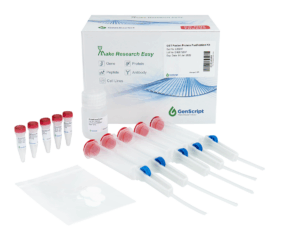
GST Fusion Protein Purification Kit
$124.20 Add to cart View Product DetailsGlutathione Resin (Cat. No. L00206) is an affinity chromatography medium designed for easy, one-step purification of recombinant glutathione S-transferase (GST) fusion proteins and other glutathione binding proteins expressed in E. coli, insect cells and mammalian cells. The recombinant GST fusion proteins can be purified directly from pre-treated cell lysate using Glutathione Resin. It is the excellent choice for high performance purifications.
GST Fusion Protein Purification Kit (Cat. No. L00207) is the derivate products of Glutathione Resin which includes five disposable columns and five 0.154 g samples of glutathione to facilitate protein purification.
-

GST tag ELISA Detection Kit
$257.03 Add to cart View Product DetailsGenScript GST tag ELISA Detection Kit is designed to quantitate glutathione-S-transferase (GST) or GST-fusion protein in samples such as cell lysate using a proprietary sandwich ELISA procedure in just 60 minutes. It utilizes two clones of GST monoclonal antibodies that bind to different epitopes of the GST tag protein at the same time. The GST monoclonal antibody, pre-coated on the plate, is used to capture GST tagged protein and the biotin conjugated GST monoclonal antibody (Biotin-GST Mab) is added to interact with GST tagged protein bound on the plate. Streptavidin-HRP is added to interact with Biotin-GST Mab and the final step involves the addition of TMB Substrate that will react with HRP to give product with an absorbance at 450 nm. The quantity of GST tagged protein in sample is determined by comparisons with the absorbance of that of a known GST tagged protein standard curve.
-
![GST-tag Antibody [HRP], pAb, Rabbit](https://advatechgroup.com/wp-content/uploads/2025/06/antibody01-300x200.jpg)
GST-tag Antibody [HRP], pAb, Rabbit
$87.98 Add to cart View Product DetailsThis antibody can be used to detect GST-fusion proteins in almost expression systems including bacterial expression system, mammalian expression system and other systems.
-
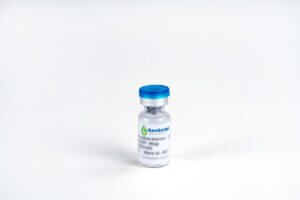
GST-tag Antibody, pAb, Rabbit
$87.98 Add to cart View Product DetailsThis antibody can be used to detect GST-fusion proteins in almost expression systems including bacterial expression system, mammalian expression system and other systems.
-
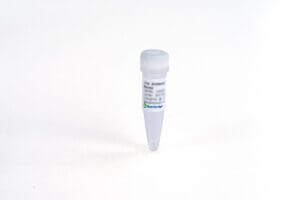
h-FABP (27C1C), mAb, Mouse
$137.14 Add to cart View Product DetailsHeart-type fatty acid binding protein (H-FABP) is encoded by the FABP3 gene with a low molecular weight of 15 kDa. It is released in large quantities into blood at an early stage of acute myocardial infarction (AMI). H-FABP is a serum marker with high sensitivity and specificity for diagnosing AMI and myocardial ischemia.
-

h-FABP (27C1C), mAb, Mouse
$1,371.38 Add to cart View Product DetailsHeart-type fatty acid binding protein (H-FABP) is encoded by the FABP3 gene with a low molecular weight of 15 kDa. It is released in large quantities into blood at an early stage of acute myocardial infarction (AMI). H-FABP is a serum marker with high sensitivity and specificity for diagnosing AMI and myocardial ischemia.
-

h-FABP (27C1C), mAb, Mouse
$11,643.75 Add to cart View Product DetailsHeart-type fatty acid binding protein (H-FABP) is encoded by the FABP3 gene with a low molecular weight of 15 kDa. It is released in large quantities into blood at an early stage of acute myocardial infarction (AMI). H-FABP is a serum marker with high sensitivity and specificity for diagnosing AMI and myocardial ischemia.
-

h-FABP (28D1E), mAb, Mouse
$137.14 Add to cart View Product DetailsHeart-type fatty acid binding protein (H-FABP) is encoded by the FABP3 gene with a low molecular weight of 15 kDa. It is released in large quantities into blood at an early stage of acute myocardial infarction (AMI). H-FABP is a serum marker with high sensitivity and specificity for diagnosing AMI and myocardial ischemia.
-

h-FABP (28D1E), mAb, Mouse
$1,371.38 Add to cart View Product DetailsHeart-type fatty acid binding protein (H-FABP) is encoded by the FABP3 gene with a low molecular weight of 15 kDa. It is released in large quantities into blood at an early stage of acute myocardial infarction (AMI). H-FABP is a serum marker with high sensitivity and specificity for diagnosing AMI and myocardial ischemia.
-

h-FABP (28D1E), mAb, Mouse
$11,643.75 Add to cart View Product DetailsHeart-type fatty acid binding protein (H-FABP) is encoded by the FABP3 gene with a low molecular weight of 15 kDa. It is released in large quantities into blood at an early stage of acute myocardial infarction (AMI). H-FABP is a serum marker with high sensitivity and specificity for diagnosing AMI and myocardial ischemia.
-

h-FABP (HC29)
$137.14 Add to cart View Product DetailsHeart-type fatty acid binding protein (H-FABP) is encoded by the FABP3 gene with a low molecular weight of 15 kDa. It is released in large quantities into blood at an early stage of acute myocardial infarction (AMI). H-FABP is a serum marker with high sensitivity and specificity for diagnosing AMI and myocardial ischemia.
-

h-FABP (HC29)
$1,371.38 Add to cart View Product DetailsHeart-type fatty acid binding protein (H-FABP) is encoded by the FABP3 gene with a low molecular weight of 15 kDa. It is released in large quantities into blood at an early stage of acute myocardial infarction (AMI). H-FABP is a serum marker with high sensitivity and specificity for diagnosing AMI and myocardial ischemia.
-

h-FABP (HC29)
$11,643.75 Add to cart View Product DetailsHeart-type fatty acid binding protein (H-FABP) is encoded by the FABP3 gene with a low molecular weight of 15 kDa. It is released in large quantities into blood at an early stage of acute myocardial infarction (AMI). H-FABP is a serum marker with high sensitivity and specificity for diagnosing AMI and myocardial ischemia.
